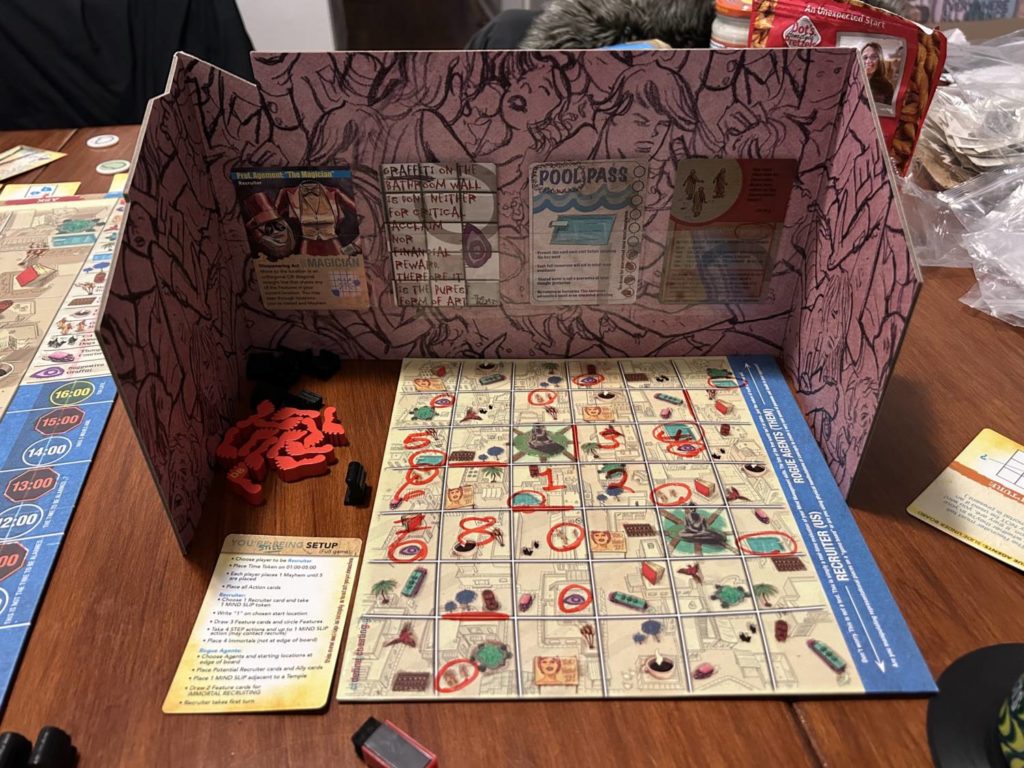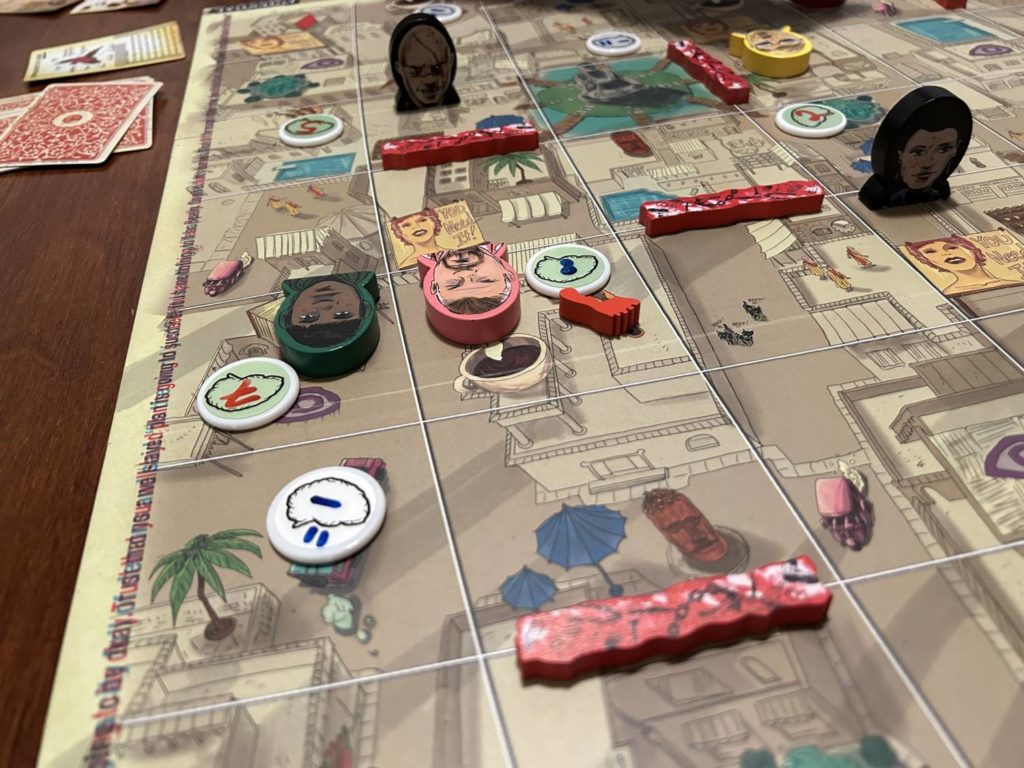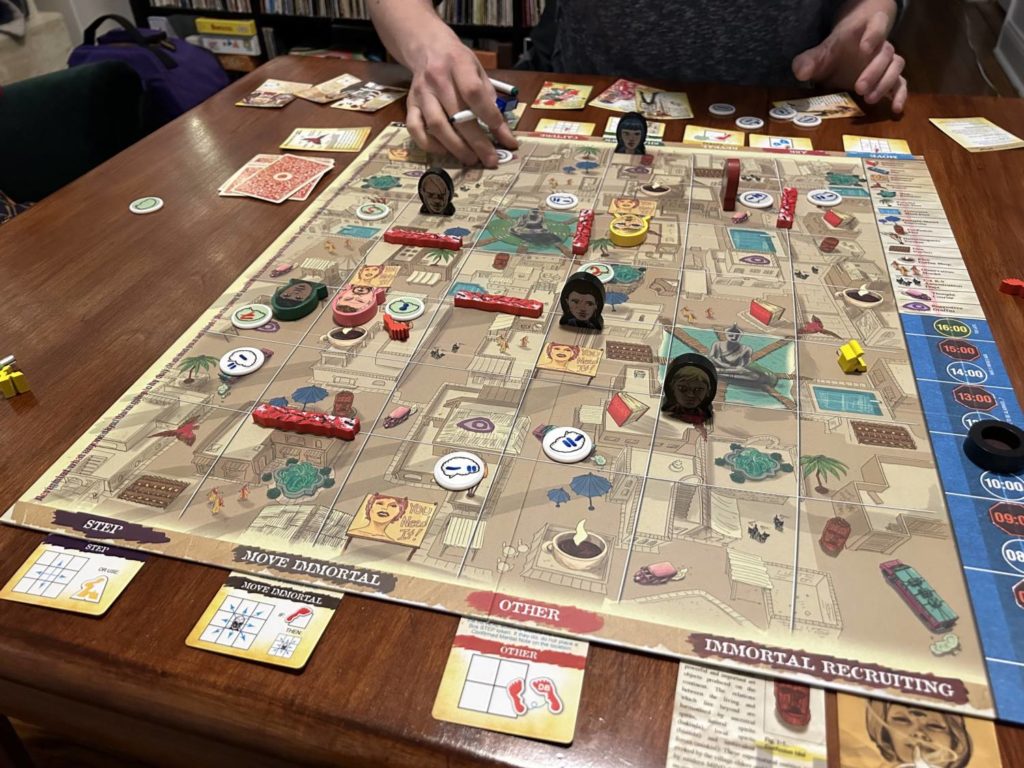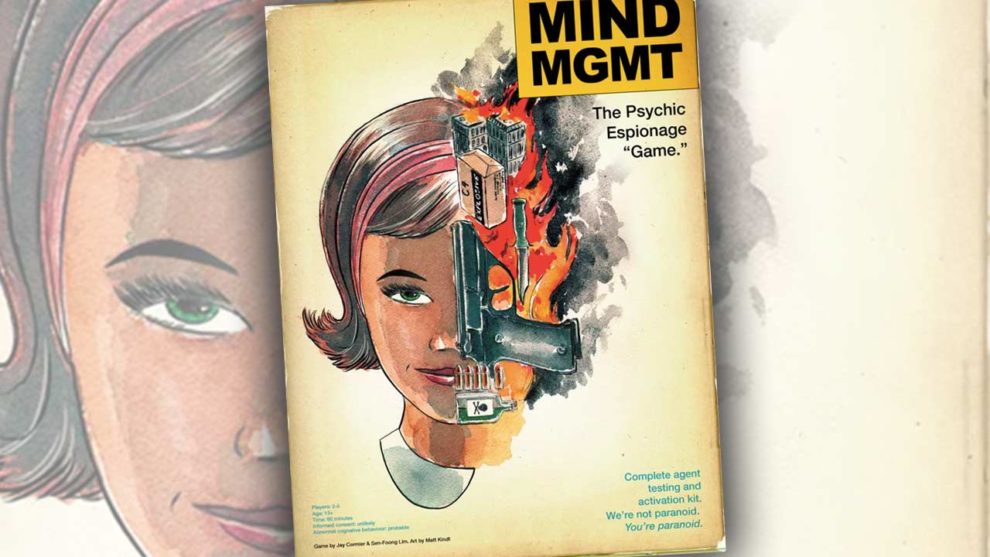Disclosure: Meeple Mountain received a free copy of this product in exchange for an honest, unbiased review. This review is not intended to be an endorsement.
MIND MGMT, all caps, is a comic by Matt Kindt, published by Dark Horse. Mind MGMT, sporadic caps, is a hidden movement game by Jay Cormier and Sen-Foong Lim, published by Off the Page Games. It’s the little differences that matter in life.
Like many hidden movement games, Mind MGMT is 1-v-all. The hidden participant plays as the Recruiter, attempting to either outlast the ten-round timer without being found or recruit 9 Agents for…some nefarious purpose. I haven’t read the comics, I don’t know the mythology. I assume the Recruiter is the baddie. The hidden mover in a hidden movement game usually is. There’s also the fact that the Recruiter’s minions, the Immortals, have skulls printed on the back of their black wooden pieces. All signs point to Bad Guy.
The other players work together as Rogue Agents, attempting to track down the Recruiter. I assume they are canonically the good guys. Their wooden pieces are painted in fun colors reminiscent of Tropical Skittles. The backs of their heads are filled with dreams. All signs point to Not the Bad Guy.
The turn structure is extremely simple. The Recruiter picks an eligible spot on the board to move to, and moves there. This is done in secret, of course, using a miniature dry-erase version of the main board. Write down the round number in the destination square you want to move to. Before or after doing that, the Recruiter can move one of their four Immortals, who help recruit Agents and interfere with the Rogue Agents.

The Rogue Agents, who can be managed by anywhere between one and four players, take turns in pairs. Once the Recruiter is done, two of them add more information to the common pool of knowledge, usually by attempting to reveal steps along the Recruiter’s path.
The so-ugly-it-almost-comes-back-around-to-being-beautiful board is divided by a grid, and each section of that grid contains a unique pairing of two out of sixteen possible symbols. If a Rogue Agent asks about a symbol on their current location, the Recruiter has to reveal whether or not they’ve been to a space with that symbol on it. If they have, they have to reveal one of the relevant spaces, by placing a wooden foot token on it. Through a different action, feet can be replaced with brains—I promise I’m not having a stroke—which tell the Rogue Agents exactly what round the Recruiter passed through that space.
The Mod Squad
Though hidden movement games are not my favorite genre, Mind MGMT is my favorite one that I’ve played. There’s a muddiness to both sides that coincides with a remarkable amount of control. You learn intentionality as you progress.
What I love most is the giddy abandon with which it explores the parameters of its system. Though not strictly a campaign game, Mind MGMT is intended to be played across fourteen matches. About half of the beefy box is taken up by a handsome folio containing fourteen modules, seven per side. The loser of each match receives a consolation prize in the form of a new module, to be used in subsequent games. The first loss for the Rogue Agents gets them access to the Psychic Tripwire, which alerts them when the Recruiter crosses over a line they place during setup. The Recruiter’s first toy is the Distraction Box, a single foot token that can be used to lie.

Each new module subverts just enough to make the whole feel different, without it being too much to implement. That’s an incredibly hard balance to strike, but Mind MGMT strikes with the enthusiasm and aplomb of a newsie. The modules also make it clear that designers Cormier and Lim understand what makes their game fun. At the end of each session, after the loser opened their new toy, my groups struggled against the urge to immediately play again. The cliffhanger is just too tempting, the immediate implications of each change too promising.
The modular nature of the unlockables keeps Mind MGMT approachable for new players. It is not only easy to set the game up as it originally came to you, it is effortless. Beyond that, unlocked modules aren’t required. You can make the play space as complex or straightforward as you want. I love how nutty the game gets with multiple modules in, but the game is equally as satisfying in its unmodified form.
Most importantly, I think, the modules never overwhelm the decision space. Win a game, and you will be at a slight disadvantage the next time, but it’s a disadvantage you can even use to your, well, to your advantage. It’s all a question of how you go about your business.
Manual Transmission
The production from Off the Page Games is astonishing. The box, particularly the folio containing the modules, is beautifully produced. Matt Kindt provided entirely original artwork for the game, even redrawing images from the comic. The privacy screen for the Recruiter is cut to follow the skyline of the buildings. The wooden tokens are unusual shapes. It’s all incredibly thoughtful.

I wish a little more thought had gone into the manual, which is abysmal. When taught by someone who has already played, Mind MGMT is not a difficult game to learn, but picking it up from the manual is laborious. Ironically, in an effort to create a first play version of the game, the manual was made significantly worse. It is confusing not only in how it is written, but how it is formatted. It is easy to miss rules, and hard to find something you’re looking for. There are games you can open with the group when you go to play for the first time. This is not one of those. Read the manual in advance.
Mind MGMT: The Psychic Espionage “Game.” is otherwise excellent. As someone who knows nothing about the property, I had a ball. The game suggests just enough of its ridiculous world to encourage you to fill in the gaps, and they are some nutty, nutty crevices. If you’re looking for a hidden movement game, I think you’d do quite well to check out Mind MGMT.












Add Comment